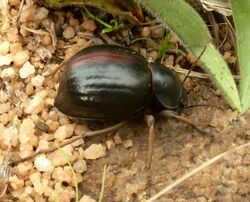Biology:Psammodes
From HandWiki
Short description: Genus of beetles
| Psammodes | |
|---|---|

| |
| Scientific classification | |
| Domain: | Eukaryota |
| Kingdom: | Animalia |
| Phylum: | Arthropoda |
| Class: | Insecta |
| Order: | Coleoptera |
| Infraorder: | Cucujiformia |
| Family: | Tenebrionidae |
| Subtribe: | Molurina |
| Genus: | Psammodes Kirby, 1819 |
Psammodes is a genus of ground-dwelling Afrotropical beetles in the family Tenebrionidae. They are black or dark rufous in color and stout in shape, and average about 2.6 cm in body length. Like the related genus Dichtha, the adults tap out a rhythm on the ground to attract and locate mates. Habitats are varied, from coastal forests to ridges and hills, woodland and deserts.[1]
Species
This genus underwent a major taxonomic revision in 2022; with most species having been reclassified as Mariazofia. As of late 2022, the genus contains 3 species,[2] including:
- Psammodes longicornis (Kirby, 1819)[3]
- Psammodes probes (Péringuey, 1899)[4]
- Psammodes sklodowskae Kamiński & Gearner, 2022[2]
References
- ↑ "Psammodes Kirby, 1819". https://www.gbif.org/species/165396076.
- ↑ 2.0 2.1 Kamiński, Marcin J.; Gearner, Olivia M.; Raś, Marcin; Hunsinger, Elliot T.; Smith, Amelia L.; Mas‐Peinado, Paloma; Girón, Jennifer C.; Bilska, Aleksandra G. et al. (2022). "Female terminalia morphology and cladistic relations among Tok‐Tok beetles (Tenebrionidae: Sepidiini)". Cladistics 38 (6): 623–648. doi:10.1111/cla.12510. PMID 35785491.
- ↑ Kirby, William (1819). "A description of several new species of insects collected in New Holland by Robert Brown". Transactions of the Linnean Society of London 12 (2): 454–82. doi:10.1111/j.1095-8339.1817.tb00240.x. https://onlinelibrary.wiley.com/doi/epdf/10.1111/j.1095-8339.1817.tb00240.x.
- ↑ Péringuey, Louis (1899). "Fifth Contribution to the South African Coleopterous Fauna; being Descriptions of New Species, chiefly in the Collection of the South African Museum". Annals of the South African Museum 1 (2): 296. https://www.biodiversitylibrary.org/item/17257#page/318/mode/1up.
Wikidata ☰ Q18745588 entry
 |

